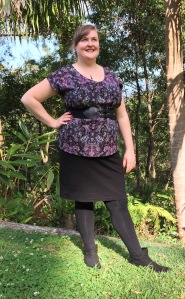TRIGGER WARNING: Domestic violence.
Call DV Connect if you need to talk to someone about your domestic situation 1800811811
It’s 12:06 pm, and I sit down at the computer for the day. After opening my internet browser, I learn that a man has died in hospital from a self-inflicted gunshot wound. He shot himself, after he shot his partner at a McDonalds restaurant on the Gold Coast.
In Queensland, the police deal with an average of 8 call-outs per hour which are related to domestic violence. I once made a call to the local police, because my neighbours were feuding on the front lawn; the woman was holding her young daughter in her arms, while her male partner was yelling and attempting to hit the woman. When I called the police, the tone of the voice on the other end was unmistakably tired. I’m sure the officer had seen it all before. This incident is not the only time I’ve witnessed domestic violence, or male dominated violence, earlier this year, a fight broke out in the local uni cafe, and a young woman was held by the neck by her male partner. I’ve also witnessed domestic violence and male dominated violence in my wider circle of family and friends. I write of these occurrences, not to draw the narrative towards my trajectory, but to illustrate the ways in which domestic violence permeates all of our lives. I’ve also experienced male dominated violence, but I’ve been fortunate enough to walk away unscathed and able to tell my story. This year, 62 women did not have that luck, and unfortunately, died as a result of domestic or male dominated violence.
I could put together all the stats in a neat table, indicating the number of women who experience domestic violence, but it’s not going to stop the pain, and it’s not going to change those stats. While getting ready this morning I was listening to the news and heard Minister Pyne tell us all, that we need to change our culture (He has a habit of telling women what they already know) towards domestic violence. On the from page of the Courier Mail we’re told that the government and community is doing something about this terrible tragedy. I’m sure all of the people pictured here (and many others) recognise the need to end domestic violence. Premier Palaszczuk has rightfully condemned this behaviour and committed to additional resources to assist DV Connect. This is a necessary move, but I can’t stop thinking this is only half of the problem. When the first line of the article states “SPORTING great Darren Lockyer has joined other prominent Queenslanders in making an impassioned plea to rise up against the domestic violence scourge, and scores of people have taken to social media to join the campaign”. I’m sure I will be forgiven for being somewhat cynical. I don’t care how great Mr Lockyer is at throwing some pig-skin around a field, it does’t make him an instant champion against domestic violence, and when a man’s sporting prowess is used to justify his stance against domestic violence it reinforces the nature of male and female dichotomy. It also patronises the survivors and victims of domestic violence, by ignoring their narrative, at the importance of a white man’s sporting ability.

Peeling back through the layers of our masculine hegemony, there is a striking imbalance when it comes to men in power and leadership.¹ Not only do we condition our children in explicitly gendered terms but our wider culture maintains the dominance of men. In the ²workplace, women comprise 26.1 percent of key management positions and 17.3 percent of CEO positions. Women are also under-represented in politics, since the represent approximately ³29 percent of parliaments. Our capacity for leadership is not related to any biological pre-disposition based on what we keep in out pants, but somehow, as a society, we equate very different abilities and traits with gender, and these traits seep further into the cultural milieu. While it looks like a large jump between a women being killed by as a result of domestic violence, we need to recognise how we got there in the first place. Not only do we expect a certain level of aggression from men, but as a culture, we are blind to the dominance of male power because it is perceived to be the status quo.
Domestic violence is a complex and wide reaching issue, but at it’s core is power. If we can address this power imbalance, we can address male dominated violence. Don’t ask why a woman stays in an abusive relationship, ask why men are still behaving like this.
¹ BATHES, R. 1927. Mythologies, New York, Hill and Wang.
² AUSTRALIAN GOVERNMENT 2014. Australia’s gender equality scorecard. In: WORKPLACE GENDER EQUALITY AGENCY (ed.)
³WILSON, J. & BLACK, D. 2014. Women Parliamentarians in Australia 1921–2013. In: SERVICES, D. O. P. (ed.). Canberra: Parliament of Australia.
